Remembering a cheerful giver from the heart of Waterloo
Cedar Valley community stalwart Bob Brown passes away
“A wounded healer is someone who can listen to a person in pain without having to speak about his or her own wounds.” — Henri Nouwen
WATERLOO — I’ve heard it said a true friend is one who really listens with the heart without expecting anything in return.
If that’s true, Robert J. “Bob” Brown had a lot of friends in Waterloo and Cedar Falls.
That’s true whether it was a mayor who had just lost an election or someone looking for a place to spend Christmas Day — anywhere but alone.
Brown, an affable, outgoing, positive former City Council member, businessman, insurance agent and a fellow who was a living example of servant leadership, passed away last week at age 93.
Bob never forgot the kindnesses shown him from very early in life. He was the son of adoptive parents. He never knew where he was born or his birth parents, only that he was adopted out of an orphanage.
He grew up on the east side of Waterloo and graduated from East High School in 1948. After a stint at Powers Manufacturing, he enlisted in the U.S. Navy, and, following his first hitch, was recalled for the Korean War, serving as a storekeeper on a refrigeration supply ship off the Korean coast.
He came back to Waterloo after service, and, after working a time at Palace Clothiers, was approached about entering the insurance business. He and a partner began an agency out of the partner’s home. Bob enjoyed the work. When that partner decided to exit the business, Brown went into partnership with brothers Jack and Rod Geist, whom he’d known from East High. The business took off and they partnered in Geist-Brown-Geist Insurance for 35 years.
In the course of that, Bob got involved in community activities, like the Waterloo Chamber of Commerce Ambassadors and the Spokesman’s Club, to which he belonged for more than 50 years. He was the chair or president of 24 different nonprofit organizations, including chamber of commerce president.
”I just enjoyed giving back to the community, because the community’s been awfully good to me,” he told me in a 2022 oral history interview for the Grout Museum District.
Bob married his wife of 55 years, Judy, in 1962 and they, in turn, raised three adopted children.
I first got to know Bob when he ran for an at-large City Council seat on incumbent Mayor Bernie McKinley’s ticket in 1987. I had just started covering Waterloo city government for the Waterloo-Cedar Falls Courier.
It was not a great time in Waterloo, let alone a great time to be seeking elected office. Rath Packing Co. had just closed and John Deere had laid off more than 9,000 people over the course of the decade. Property values plunged and the popular saying was “Last one to leave Waterloo, turn out the lights.”
But McKinley assembled one of the most demographically balanced tickets the city had ever seen -- three business owners, two individuals with organized labor connections, two women and two Blacks. They had divergent political views but all wanted to pull the city out of the economic ditch it was in.
McKinley and his ticket won a landside victory. It included Sammie Dell, a Vietnam veteran and administrator at Hawkeye Community College who ran with Bob for the other at-large council seat. Sammie became the first Black elected to a citywide post in Waterloo municipal government. He pulled more votes than any of the mayoral candidates.
Sammie had as big a heart as Bob did, though they disagreed politically. And they both showed that heart, ironically, during one of their most contentious debates in their time on the council.
The city had helped fund a number of outside human service agencies for years prior to the ‘80s recession. Bob supported them all, many of them personally, but felt they should not be part of the city budget. The city was not the United Way, he said, and he felt city finances should go to city services like fire and police protection.
Sammie disagreed. “People need to know someone in this building cares about them,” he said.
”What you’re saying is, I don’t care,” Bob replied.
”No. If that were the case I’d say that,” Sammie insisted.
Both of them were stung by the exchange.
At the next council meeting. Sammie, who sat on the opposite end of the council table from Bob, asked him to come around and meet him in front of the table.
Bob came around. Sammie extended his arms as to invite an embrace. Bob realized it and did the same. The two gave each other a big hug in front of the mayor, the council and the public.
Bob, a tall sinewy guy, sort of went limp like an unstrung marionette and he wrapped his arms around his council colleague. It was a pretty emotional moment.
Sammie said he wanted to show the council, despite the disagreement, was united, as an example to the community.
He also knew Bob Brown walked the walk as well as talked the talk. Bob lent his support of all kinds of causes, not the least of which was a “crisis fund” through the local community foundation to help displaced or disadvantaged persons. He also served on the Black Hawk County Veteran Affairs Commission.
And Bob was one of a group of business and community leaders who, knowing the unity Sammie spoke of was essential, supported local civil rights activist Anna Mae Weems in trying to promote understanding and empowerment. They took Urban Potential race relations training from none other than the Rev. C.T. Vivian, of the Southern Christian Leadership Conference, who was featured on the PBS documentary, “Eyes on the Prize.” Weems set up the sessions with Rev. Vivian in Waterloo.
In 1992, Bob and others also accompanied Weems to the Martin Luther King Center in Atlanta and personally met with Coretta Scott King.
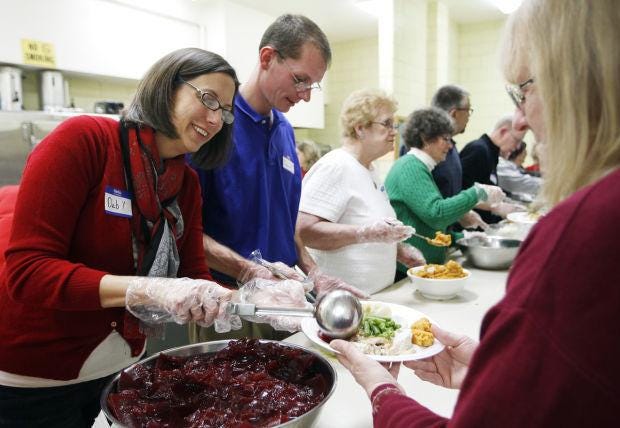
Bob brought some lighthearted moments to city government too. In March 1991, when Mayor McKinley submitted to the City Council a good humored, totally symbolic “No Grump Week” proclamation extolling a city recovery, Bob cast the only “no” vote.
”I think you’re depriving grumps of their legal rights,” Bob deadpanned.
But Bob’s and Judy’s real calling, their “passion” as Bob put it, was the annual Christmas Day dinner at Westminster Presbyterian Church in Waterloo. They and a cadre of volunters started it in 1981 and ran it for almost 35 years. It continues today.
Hundreds have attended the dinner annually, from all walks of life — many of them scparated from family and friends by circumstance or distance.
The dinner hosted some of Waterloo’s first Bosnian refugees when they arrived in the mid-1990s. On another occasion, a gentleman in the criminal justice system took advatage of the dinner to have a supervised Christmas gathering with his children. Another couple had lost a daughter to suicide and drove 90 miles just to be part of the dinner.
People should not be alone on Christmas, Bob said. His faith and his humanitarianism went hand in hand.
I got the urge to help too. Following my divorce, instead of spending Christmases alone, I volunteed at the dinner for almost 20 years, picking up people to bring to the dinner and delivering meals to the homebound. I also performed double duty and got a good Courier feature story out of the dinner every year, since Bob and Judy pulled in a large cross-section of the community.
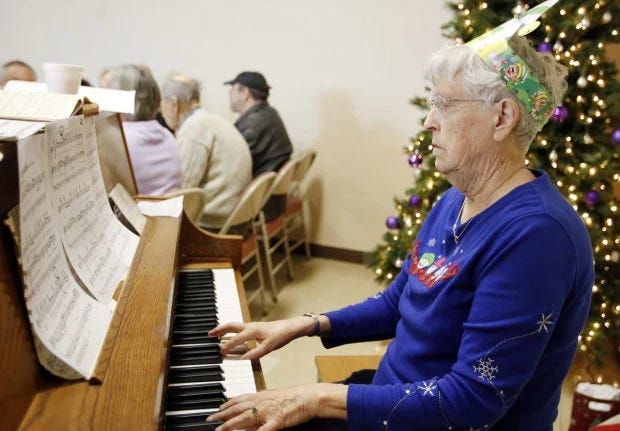
After others in the church took over the dinner when the Browns’ health declined and Judy passed away in 2018, I stayed in touch with Bob and tried to call him around the holidays, because I knew how much doing that dinner meant to him. And, true to form, our conversations always revolved around how I was doing, much as I was trying to check on him. I was on his prayer list, he said.
He was always about looking out for and seeking recognition for others. Right up until his death he was on the Courier’s nominating committee for “Eight over 80” honorees for lifetime community leadership.
Following his faith, Bob didn’t believe in laying up treasures for himself in his worldly life - only what came after it.
In the New Testament in the Bible, the Book of Luke, chapter 12, verse 24 says: “For where your treasure is, there your heart will be also.”
Bob Brown’s heart was squarely in the heart of Waterloo and with its people.
Pat Kinney is a freelance writer and former longtime news staffer with the Waterloo-Cedar Falls Courier and, prior to that, several years at the Ames Tribune. He is currently an oral historian with the Grout Museum District in Waterloo. His “View from the Cedar Valley” column is part of “Iowa Writers Collaborative,” a collection of news and opinion writers from around the state who previously and currently work with a host of Iowa newspapers, news organizations and other publications. Click on their links below to sample their work.
The Iowa Writers’ Collaborative


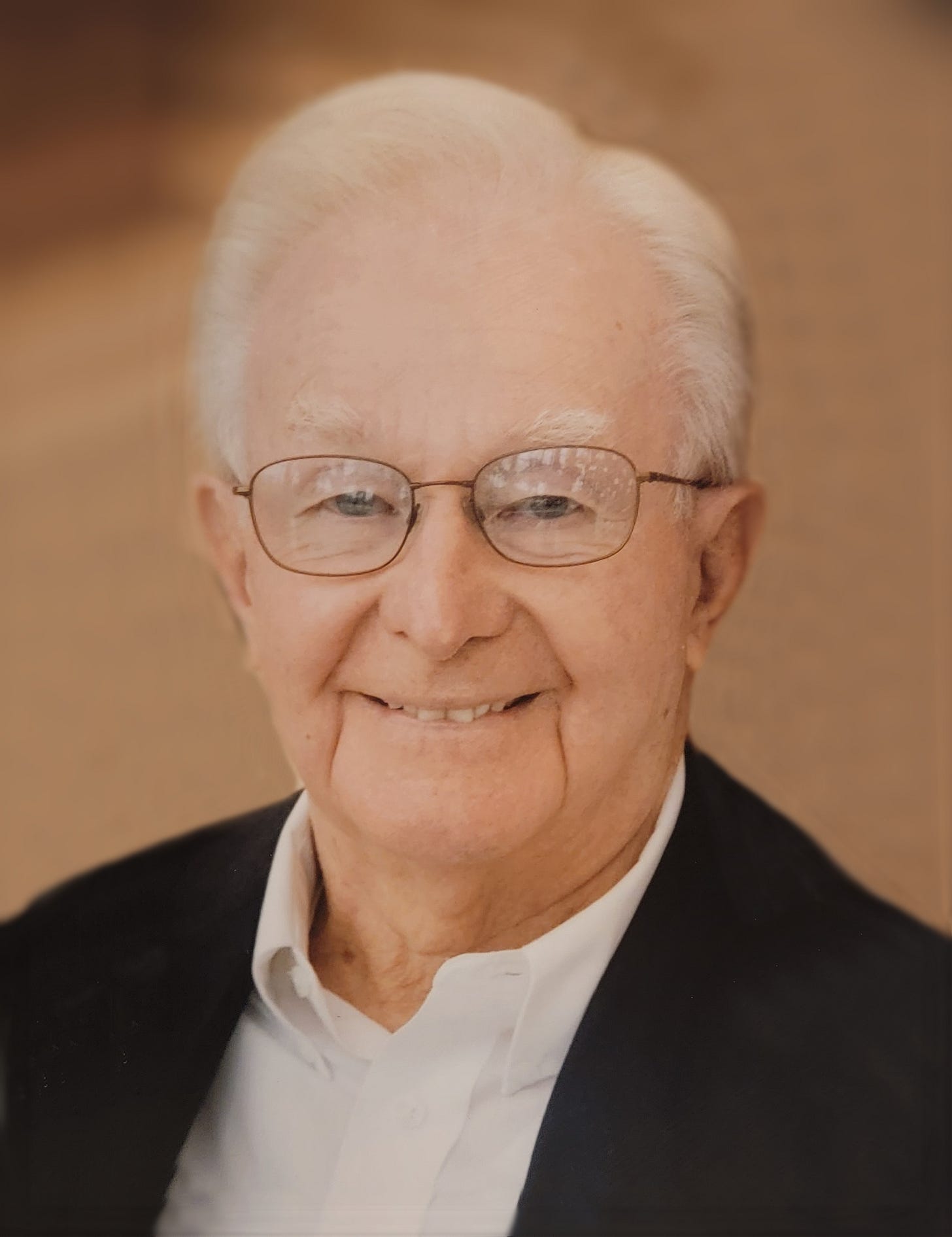
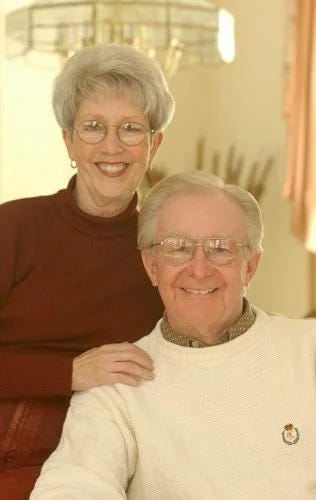
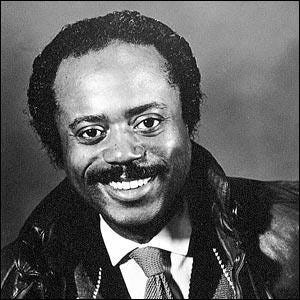
A great summary of Bob’s involvement and character. A wonderful human being.
Wow, I wish I’d known Waterloo’s Bob Brown. Terrific story, Pat.